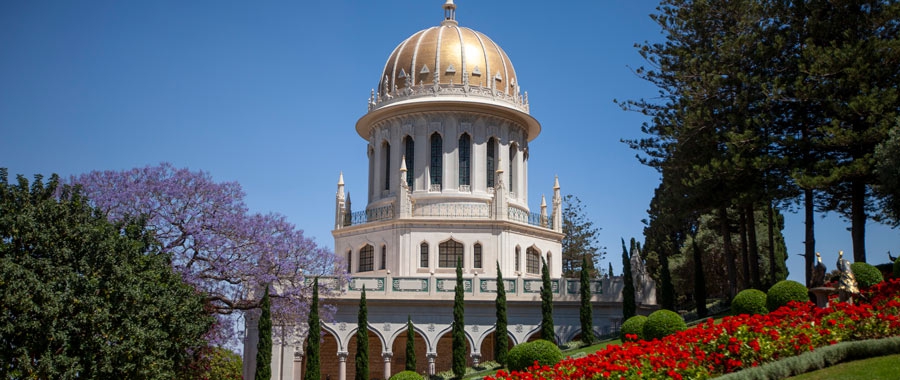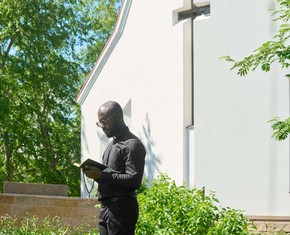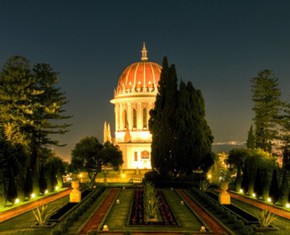The views expressed in our content reflect individual perspectives and do not represent the authoritative views of the Baha'i Faith.
In his writings, Baha’u’llah ruled out the creation of any form of priesthood or clergy among his followers.
For this reason, Baha’is have no priests, deacons, vicars, bishops, clerics, mullahs, monks, nuns, rabbis, gurus, pastors, preachers, reverends or ministers. For Baha’is, no rank of professional individuals leads the religion.
Instead, the leadership bodies of the Baha’i Faith – at the local, regional, national and international levels – are democratically elected from the entire body of the believers. That unique process involves no nominations, campaigning or partisanship. Instead, Baha’i elections are held in a quiet spiritual atmosphere where everyone votes for those their conscience dictates by considering:
… without the least trace of passion and prejudice, and irrespective of any material consideration, the names of only those who can best combine the necessary qualities of unquestioned loyalty, of selfless devotion, of a well-trained mind, of recognized ability and mature experience. – Shoghi Effendi, Baha’i Administration
Obviously, this represents a major departure from previous religious practice. Most of the religions of the past have relied upon a professional clerical class to lead their followers, but Baha’is believe the necessity for that kind of anointed leadership – and the potential it creates for confusion, corruption and sectarianism – has definitely passed:
O Concourse of divines! … Lay aside that which ye possess, and hold your peace, and give ear, then, unto that which the Tongue of Grandeur and Majesty speaketh. …
Were ye, O high priests, to discover the perfume of the rose-garden of understanding, ye would seek none other but Him, and would recognize, in His new vesture, the All-Wise and Peerless One, and would turn your eyes from the world and all who seek it, and would arise to help Him. …
This is not the day whereon the high priests can command and exercise their authority. – Baha’u’llah, The Proclamation of Baha’u’llah
The clergy, a prominent feature of the religious history of bygone ages, served a purpose when the general population was for the most part illiterate. During those times, these kinds of religious leaders had a very important social role in the spiritual education of the masses. They were responsible for teaching the religion, upholding its principles and representing its interests. In their capacity as teachers, religious leaders made the words of the messengers of God accessible to people and answered questions about the messenger’s teachings, serving as intermediaries between the prophet and the people. Much historical credit must be given to these individuals, because there were times when, if it had not been for their work, the light of religion would have gone out.
In this age, however, when the general level of education has risen to the point where individuals can learn to read, evaluate and attempt to understand the words of God for themselves, Baha’is believe there is no longer any need for this kind of religious role. To perpetuate such a clergy now would only mean substituting the opinions of the individual for the authority of the written word of God, which Baha’u’llah has newly proclaimed to the entire world:
Among these teachings was the independent investigation of reality so that the world of humanity may be saved from the darkness of imitation and attain to the truth; may tear off and cast away this ragged and outgrown garment of 1,000 years ago and may put on the robe woven in the utmost purity and holiness in the loom of reality. – Abdu’l-Baha, Tablet to the Hague
Although no professional religious leaders exist in the Baha’i Faith, it does have a highly organized administrative structure – one that relies entirely on a spiritually-driven democratic model.
When Baha’u’llah proclaimed his new Faith, he established a modern system of administration which entrusts the authority to administer, adjudicate and legislate the affairs of the religion into the hands of elected institutions which are consultative in nature. Several levels of these administrative bodies exist, depending on the local, regional, national and international communities they serve. That localized and yet universal administrative structure allows the Baha’i Faith, foreseen by Baha’u’llah as a dynamic, ever-evolving organic community, to grow and respond to the advancing needs of the times.
The scope and specialized focus of these Baha’i institutions will naturally evolve as the numerical strength of the adherents of this world-encompassing Faith grows. At present, these local, regional and national institutions are each composed of nine annually elected individuals. An international convention is held every five years for the election of the Universal House of Justice, the global administrative body of the Faith. This supreme administrative body of the Baha’i Faith has the responsibility for guiding its progress and development. The Universal House of Justice has its seat at the Baha’i World Centre on Mount Carmel in Israel.
In addition to these elected administrative bodies, Baha’u’llah made provision for appointed institutions whose function is to act as learned advisers to the elected institutions. The responsibility of informing others about the message of Baha’u’llah, however, rests on the shoulders of every individual Baha’i. Each Baha’i studies the writings of Baha’u’llah for themselves, and to the best of their ability incorporates those teachings into their daily lives, so that when they are asked about the principles of the Baha’i Faith, they can both describe and demonstrate these principles. Each Baha’i, in a sense, offers themselves as an example of their faith in action, making the Baha’i Faith a religion in which one’s deeds speak louder than one’s words:
O Son of My Handmaid! Guidance hath ever been given by words, and now it is given by deeds. Every one must show forth deeds that are pure and holy, for words are the property of all alike, whereas such deeds as these belong only to Our loved ones. Strive then with heart and soul to distinguish yourselves by your deeds. In this wise We counsel you in this holy and resplendent tablet. – Baha’u’llah, The Hidden Words
















Comments
Sign in or create an account
Continue with Googleor